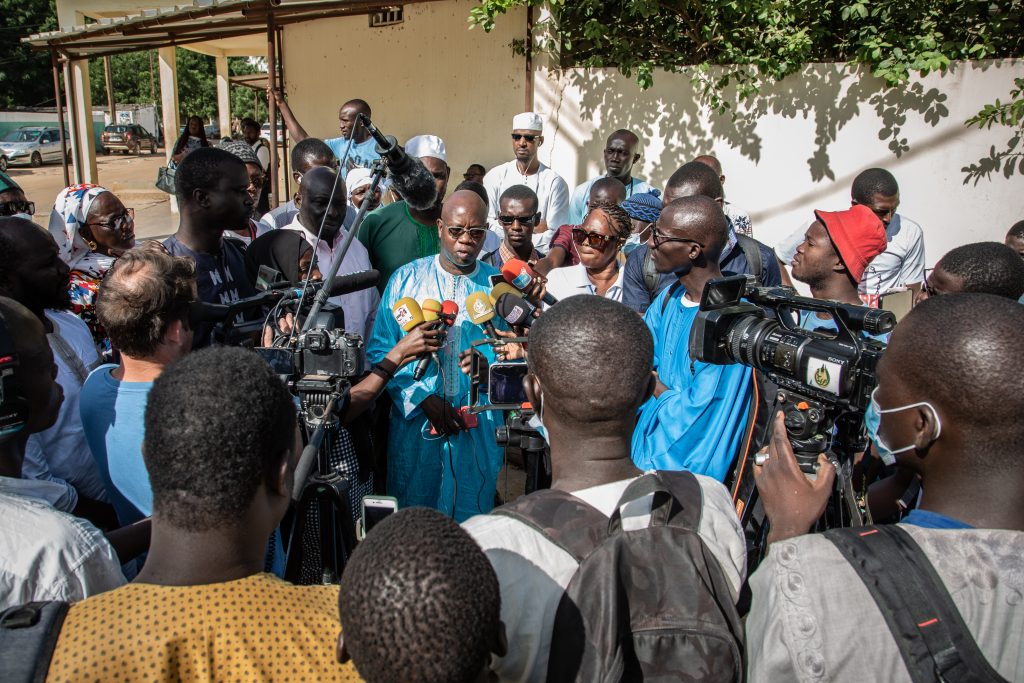Thiès, Senegal, 3 November – Responding to the decision by the President of the High Court of Thiès to dismiss the request to temporarily close the Touba Protéine Marine (formally ‘Barna’) fishmeal factory in Cayar on the basis that it is polluting the town’s air, soil and water source, a spokesperson for Greenpeace Africa said:
“This is deeply disappointing for the people of Cayar – and for everyone in West Africa who wants to protect marine life, jobs, access to food and the right to a healthy environment from destructive industries.
“Last month, the court was shown evidence of toxic metal levels exceeding legal limits in Cayar’s tap water and in the lake which is connected to the same groundwater,[1] as well as video documentation of the factory’s trucks repeatedly dumping fish waste effluent in the lake.[2]
“Despite this setback, we have confidence that the law will protect female fish processors and fishermen, to make fish affordable and available to people again and that children will be protected from factories polluting their water, air and land.
“This outcome only strengthens our resolve. Should we let this go on, then one day corporations will take the last fish out of our seas. And the factories like the one in Cayar will turn the last fish into fishmeal, and sell it to other countries to feed their animals.[3]
“We will not give up. We won’t let the rich and powerful sell Senegal’s future. The people of Cayar will continue their struggle because they don’t have a choice.”
Thaddée Adiouma Seck, Senior Programme Officer at Natural Justice, which is also supporting the litigation, said:
“This decision by the Court is particularly regrettable. If, in light of the evidence provided by the community, the judge did not sanction the company, this means that awareness raising on environmental issues remains urgent. However, we do not intend to give up, as the fight for a healthy environment is a fight for future generations.”
Ends
Notes to editors
[1] The independent laboratory analyses, which followed water sampling verified by a bailiff, revealed:
- High levels of toxic metals in the tap water, including more than thirty times the level of selenium and four times the legal level of chromium, according to Senegal’s legal code NS-05-033, which applies to drinking water.
- High levels of toxic metals in the lake water, including more than three times the legal level of selenium and nearly three times the legal level of chromium, according to Senegal’s legal code NS-05-061, which applies to bodies of water such as lakes.
- Low oxygen levels in the lake water. The results suggest that Lake Mbawane is polluted with biodegradable organic matter, and that as a consequence, the lake is poorly oxygenated and uninhabitable for fish and other aquatic life. This accords with Greenpeace Africa’s documentation of the factory’s truck dumping fish waste effluents in the lake.
[2] Video footage that was shown in court of one occasion in August this year when Taxawu Collective members, Greenpeace Africa campaigners and a bailiff witnessed a truck from the factory arriving at the lake, dumping fish waste effluent and leaving, can be accessed here.
[3] In June the FAO’s State of World Fisheries and Aquaculture report stated: “the sustainability of some fisheries remains of great concern in some countries where fishmeal production is on the rise. This is the case in some countries in West Africa, where an increasing amount of catches are reduced into fishmeal for export purposes, rather than used for human consumption. In Senegal, for instance, whole fish used for decades for direct human consumption are now being redirected into production of marine ingredients. This not only increases the pressure on fishery resources, but it impacts food security and livelihoods. In these areas, it is essential to improve governance and fisheries management, while prioritizing the utilization of fish for human consumption”. (FAO, 29 June 2022, p. 77)
Press contacts
For West African outlets:
Amagor Robert Niang, Communications Officer, Greenpeace Africa
aniang@greenpeace.org
+221771834049
Eliane Nyobé, Communication and et Campaign Officer, Natural Justice Francophone Africa
+221785255937
For other outlets:
Richard Sayeed, International Communications Coordinator, Greenpeace Africa
Katherine V Robinson
Head of Campaigns and Communications, Natural Justice
Greenpeace Africa press office pressdesk.africa@greenpeace.org

